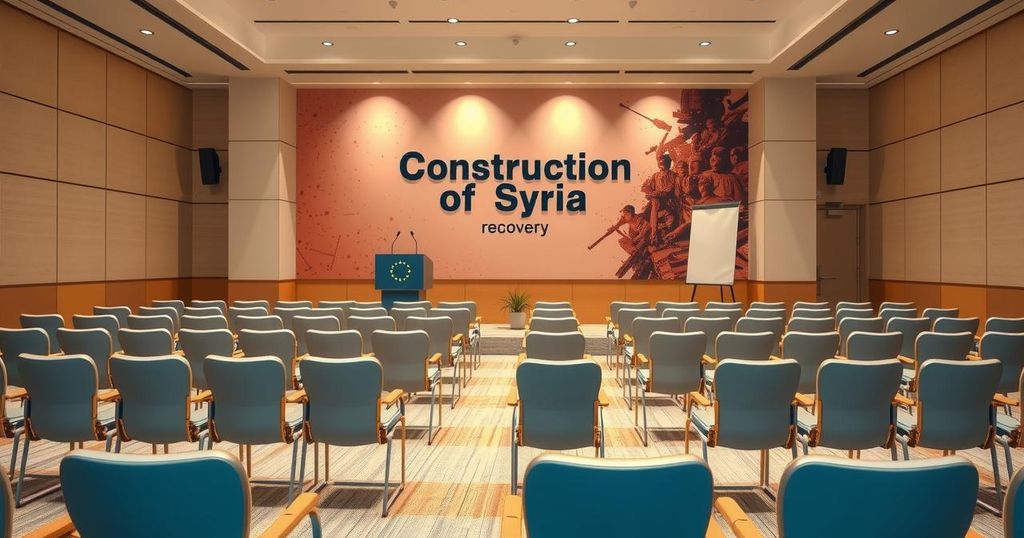Weiser Diplomacy Center Hosts Discussion on Syria’s Reconstruction Challenges

The Weiser Diplomacy Center’s recent event featured Qutaiba Idlbi and Dr. Abdalmajid Katranji discussing Syria’s reconstruction following the civil war. They addressed the aftermath of Assad’s regime, current governance under Ahmed al-Sharaa, and the challenges and potential in rebuilding the country amidst public optimism and significant external factors such as sanctions.
The University of Michigan’s Weiser Diplomacy Center held a lecture featuring Qutaiba Idlbi from the Atlantic Council and Dr. Abdalmajid Katranji from Michigan State University, discussing Syria’s reconstruction following a 14-year civil war. The discourse emphasized the government transition after Bashar al-Assad’s regime fell on December 8, 2024, and the reconstruction pathways ahead for Syria.
Idlbi underscored the substantial devastation resulting from the civil war, particularly the “brain drain” effect—where a significant portion of the educated populace has left the country. He articulated the size of the displacement, stating, “There’s a lot for Syrians to rebuild; half of Syria has left the country.”
Despite the turmoil, Idlbi noted a prevailing sense of optimism among many Syrians who feel liberated from previous authoritarian rule. He stated, “They are still high on joy and happiness that they finally got their country back,” highlighting a duality of suffering alongside a hopeful joy for newfound freedom.
The current leader, Ahmed al-Sharaa, has been criticized for alleged ties to Al-Qaeda. However, Idlbi and Katranji argued that he has severed connections with the group and actively opposed both Al-Qaeda and ISIS. Katranji spoke of successful humanitarian efforts in Idlib and the emergence of civil society institutions amidst the chaos.
Katranji contrasted his experiences in Idlib with conditions in Assad-controlled territories, where he encountered significant bureaucratic hurdles during humanitarian relief efforts. He noted, “There was no structure, and we were still rescuing people trapped underneath the building,” advocating for a comparison in governance effectiveness between regions.
Idlbi reflected that the civil war inadvertently allowed Syrians the opportunity to form self-governing institutions, unlike Iraq post-Ba’ath party era. He suggested that this spontaneous development led to a more organically built political structure, saying, “In Syria, there was that gap where Syrians were able to come together.”
Despite past missteps in U.S. foreign policy, Idlbi called for American involvement in Syria’s reconstruction, emphasizing support rather than imposition. He stated, “We can’t really escape who we are: We’re the empire of this era… Do they need our support? Absolutely.”
Katranji highlighted the consequences of U.S. sanctions on Syria under the Caesar Act, which have persisted despite regime changes. He emphasized that inaction may lead to further instability, asserting, “If you wait too long, then another vacuum will be created, somebody else will step in.”
The urgency for sanction reform was reiterated, with Katranji stressing collaboration with civic leaders in the U.S. He pointed to global calls for sanction relaxation and the necessity for a unified approach in aiding Syria’s recovery. He noted, “The next three months are absolutely critical… globally, the European Union has already relaxed sanctions.”
In an interview, Razaan Killawi, co-president of Students Organize for Syria, expressed appreciation for the talk and encouraged more student engagement on the issue. She highlighted the importance of firsthand narratives from Syrians to combat misinformation, stating, “It’s really meaningful when students… learn from them and see what is actually happening.”
In conclusion, the discussion at the Weiser Diplomacy Center highlighted the intricate challenges of reconstructing Syria after years of civil strife. The speakers emphasized the importance of civil society, the need for international support while respecting Syrian autonomy, and the critical nature of revising U.S. sanctions. The dialogue not only reflected past struggles but also painted a picture of hope and resilience among the Syrian people as they strive to rebuild their nation.
Original Source: www.michigandaily.com








